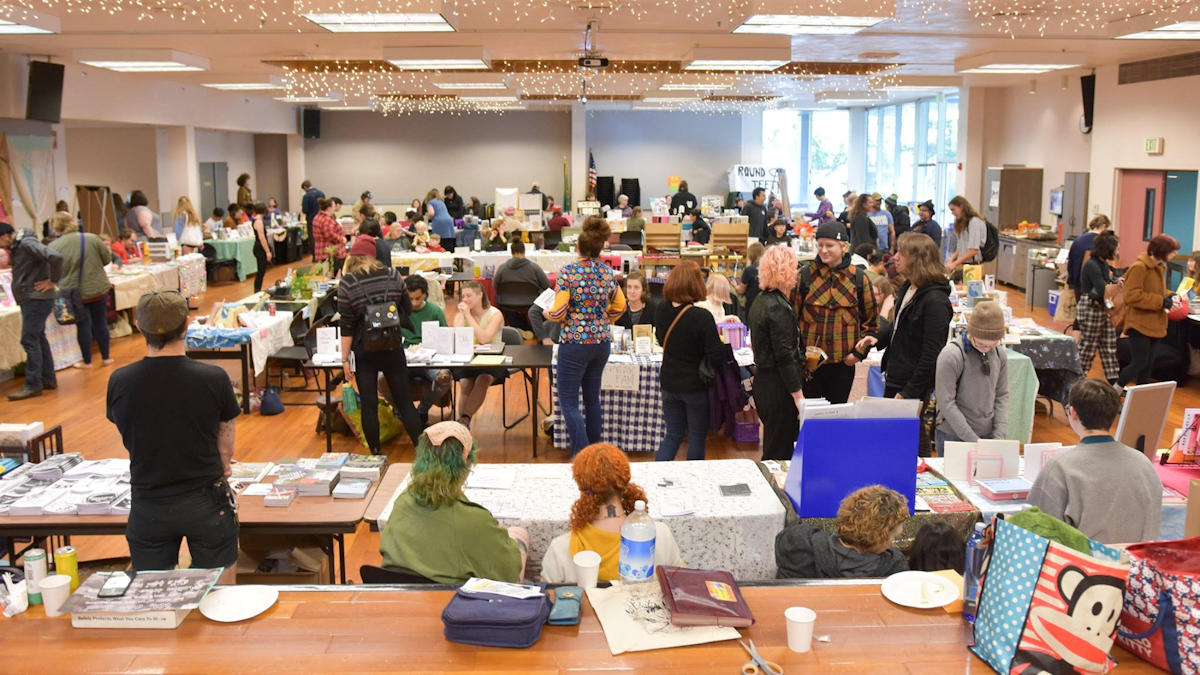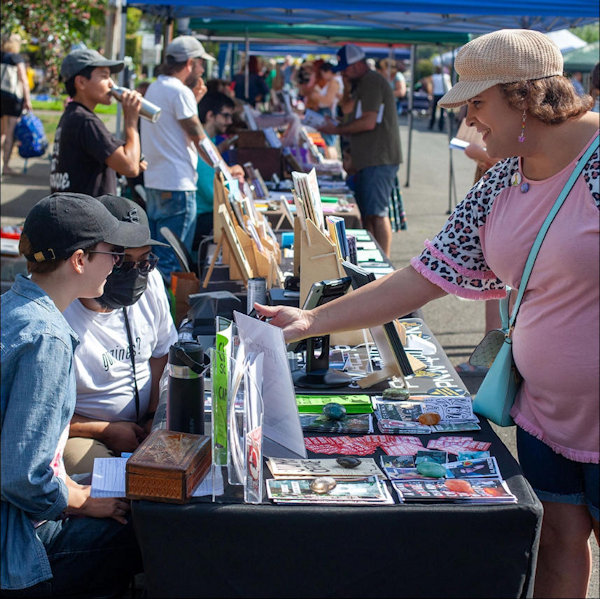
The most unlikely survivor of the pre-internet alternate culture of the ’80s and ’90s might be the zine. These cheap, self-produced booklets, usually a DIY affair from a publishing house of one, are printed on photocopiers, arcanely folded and stapled, then distributed via coffee shops, lefty bookstores or handcrafted patron mailing lists. That’s a lot more effort and a lot less potential audience than you’d get starting a blog or even setting up a podcast.
But according to Aggie Burstein, curator of Timberland Regional Library’s Zine Library and chief organizer of the Teeny Tiny Zine Fair, the zine scene hasn’t just survived, it’s thriving — not only because they’re subversive and adaptive, but hard to define. “One of the cool things about zines is that there aren’t really any rules,” says Burstein, whose own definition doesn’t go further than “an independently created publication that anyone can make, about anything, for any reason.”
Olympia’s love affair with zines goes back to at least the ’80s, when both the Riot Grrrl music movement and the alternative comic wave (Matt Groening, Lynda Barry, et al) were deeply intertwined with zine culture. Zines were the epitome of what was new, alternative, fun and even cheekily disposable, mixing visual art, anarchic graphics and wildly divergent viewpoints into an ink-blotted stapled stack.
The tangible existence of a zine — the feel of the paper, the cut-and-paste graphics or hand-drawn art — gives the written content its own flavor, significantly different from the endless and undistinguished product of mainstream publishers, websites, blogs, substacks and other internet writings. Encountered randomly, sometimes handed to you by the author, zines give a little bit of real-world contact in an often lonely and virtual world.
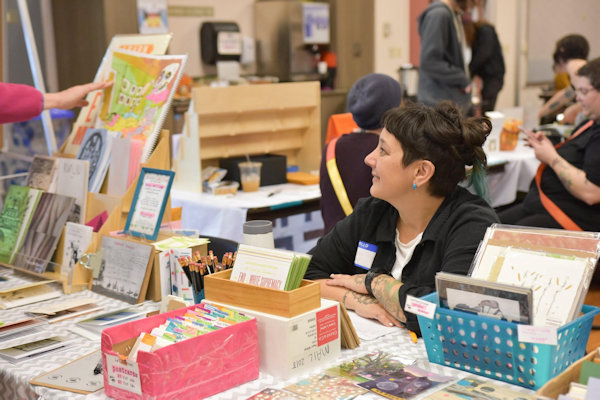
Mainstream media largely ignored zines 40 years ago and there was even less academic interest. When the now-retired librarian (and current author of zine comic “Cranium Frenzy”) Steve Willis began setting up WSU’s Zine Collection in the early ’80s, he got a fair amount of push-back from his academic peers. But as he recalls, by the time the Timberland Library’s collection was founded in the early 2000s, the idea of preserving and circulating zines had been mainstreamed.
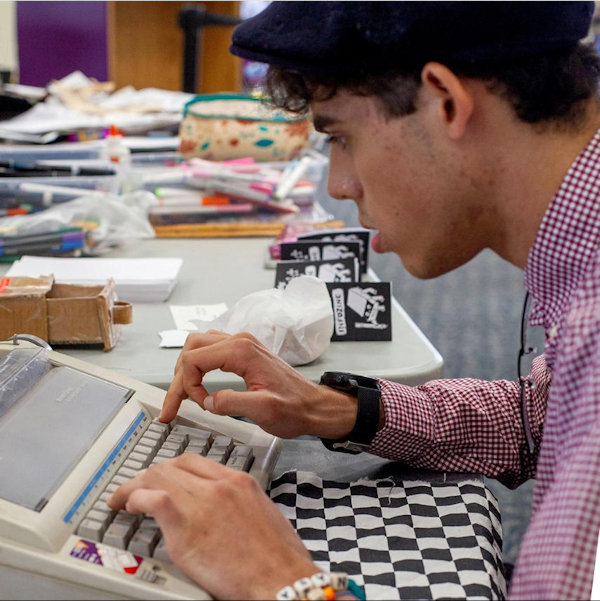
Burstein agrees. “I’ve never heard any criticisms. Zines belong in a public library,” adding that they provide “a unique perspective not found in mainstream media.” A cheap and popular medium that spotlights marginalized voices, they’re excellent value, and particularly great for anyone interested in local history and culture. Best of all from a librarian’s perspective, “they don’t take up a lot of space and are cheap or free to obtain.”
Zines might be one of the few surviving mediums that deserve the nomenclature of “alternate” and “subversive” in a culture that tends to market these words as just another flavor of cool. “They can be fully anonymous, while content on the Internet can be traced back to a person,” Burstein says, and given current concerns about online surveillance for both kids and adults, that’s a welcome alternative. “It’s worth noting, too, that the Internet and zines don’t have to be an either/or dichotomy. Not only are many zines found online to read and print, many zinesters promote and sell their work online, find out about zine fests and apply to them, get source material, and so much more.”
This year’s Teeny Tiny Zine Fair is a scaled-back version of the regular event, held in the spring for the first time. (Past fall fairs were three-day affairs with multiple linked events — which Burstein hopes will be the case again by next May.) Still, even this pared-down inside event has plenty of activities and zine authors hawking their wares. Attendees can learn to make buttons and zines, visit the expo area with about 30 zinesters, enjoy on-site DJs, and kick back in a quiet zine reading area for browsing.
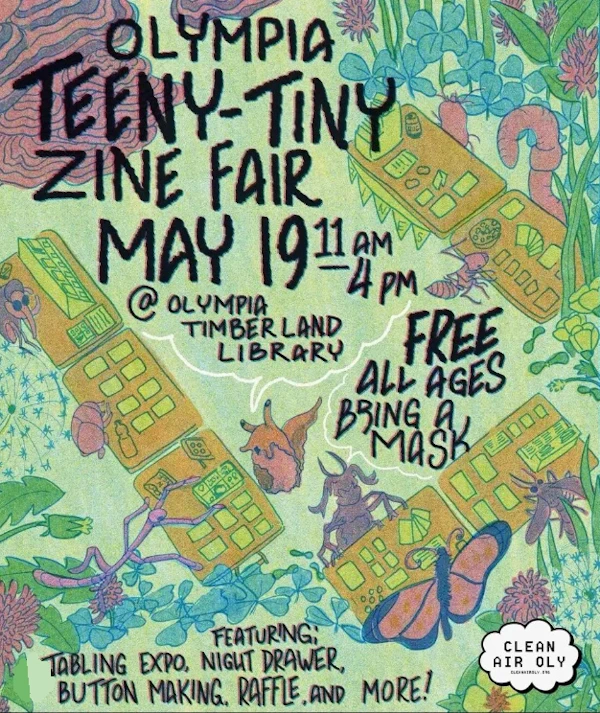
Some of this year’s crop of zine authors include:
• Charlie Birch – real quality about queer and trans identities, disability, sexual/reproductive health, mental health, and Bigfoot.
• zines + things – zine collective based in Portland with really great poetry, prose, art, and comic zines.
• Craft or DIY – Olympia-based zinester Alyssa, who makes zines and art on mental health, activism, emotional intimacy, nature and DIY music.
All photos are from 2019 and 2023 zine fairs, Courtesy of Olympia Zine Fest.
WHAT:
Teeny Tiny Zine Fair
WHEN:
11 a.m. to 4 p.m. May 19
WHERE:
Olympia Timberland Library, 313 8th Ave., SE, Olympia
LEARN MORE:
Instagram @olyzinefest
website www.olympiazinefest.org
email olympiazinefest@gmail.com

